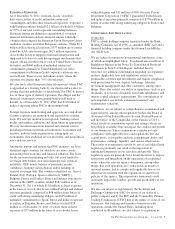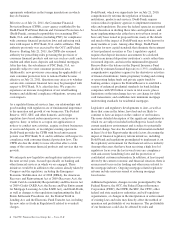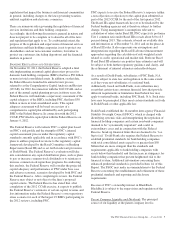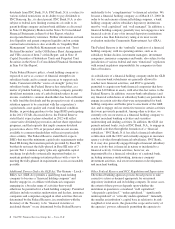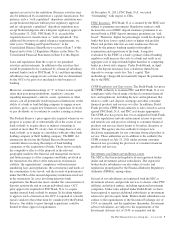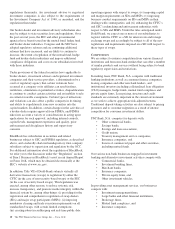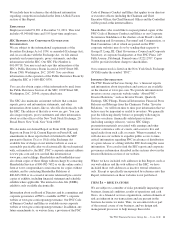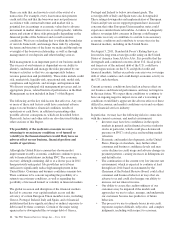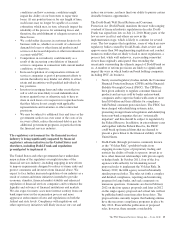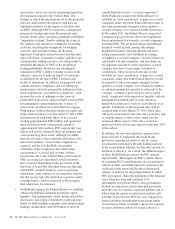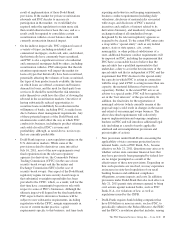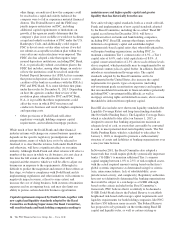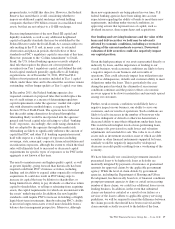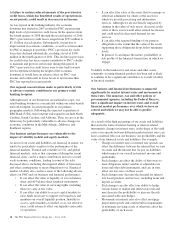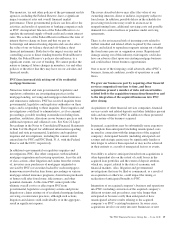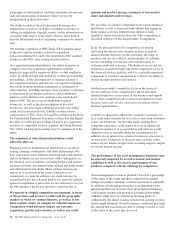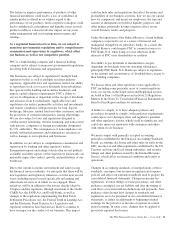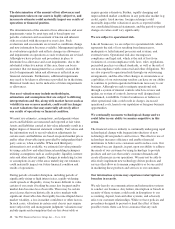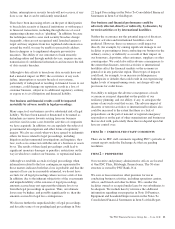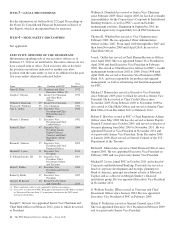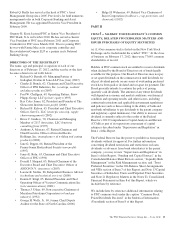PNC Bank 2011 Annual Report Download - page 24
Download and view the complete annual report
Please find page 24 of the 2011 PNC Bank annual report below. You can navigate through the pages in the report by either clicking on the pages listed below, or by using the keyword search tool below to find specific information within the annual report.result of implementation of these Dodd-Frank
provisions. If the market for private securitizations
rebounds and PNC decides to increase its
participation in that market, we would likely be
required under the regulations to retain more risk
than would otherwise have been the case, and as a
result could be required to consolidate certain
securitization vehicles on our balance sheet, with
currently an uncertain financial impact.
• On the indirect impact side, PNC originates loans of
a variety of types, including residential and
commercial mortgages, credit card, auto, and student,
that historically have commonly been securitized,
and PNC is also a significant servicer of residential
and commercial mortgages held by others, including
securitization vehicles. PNC anticipates that the risk
retention requirements will impact the market for
loans of types that historically have been securitized,
potentially affecting the volumes of loans securitized,
the types of loan products made available, the terms
on which loans are offered, consumer and business
demand for loans, and the need for third-party loan
servicers. It should be noted that the risk retention
rules themselves could have the effect of slowing the
rebound in the securitization markets. One effect of
having substantially reduced opportunities to
securitize loans would likely be a reduction in the
willingness of banks, including PNC, to make loans
due to balance sheet management requirements. Any
of these potential impacts of the Dodd-Frank risk
retention rules could affect the way in which PNC
conducts its business, including its product offerings,
and could also affect PNC’s revenue and
profitability, although, as noted above, not in ways
that are currently predictable.
• Dodd-Frank imposes a new regulatory regime on the
U.S. derivatives markets. While some of the
provisions related to derivatives came into effect
July 16, 2011, most of the new requirements await
final regulations from the relevant regulatory
agencies for derivatives, the Commodity Futures
Trading Commission (CFTC) (in the case of non
security-based swaps) and the Securities and
Exchange Commission (SEC) (in the case of
security-based swaps). One aspect of the Dodd-Frank
regulatory regime for non security-based swaps is
that substantial oversight responsibility has been
provided to the CFTC, which, as a result, will for the
first time have a meaningful supervisory role with
respect to some of PNC’s businesses. Although the
ultimate impact will depend on the final regulations,
PNC expects that its derivatives business will be
subject to new substantive requirements, including
registration with the CFTC, margin requirements in
excess of current market practice, capital
requirements specific to this business, real time trade
reporting and robust record keeping requirements,
business conduct requirements (including daily
valuations, disclosure of material risks associated
with swaps, and disclosure of PNC’s material
incentives and conflicts of interest related to its
derivatives business), and mandatory clearing and
exchange trading of all standardized swaps
designated by the relevant regulatory agencies as
required to be cleared. To the extent PNC enters into
a swap with a “special entity” such as any federal
agency, state or state agency, city, county,
municipality, or other political subdivisions of a
state, additional business conduct requirements will
be imposed on PNC, including the requirement that
PNC have a reasonable basis to believe that the
special entity has a qualified representative that
undertakes a duty to act in the best interests of the
special entity and that is independent of PNC and the
requirement that PNC disclose to the special entity
the capacity in which PNC is acting in connection
with the swap (and if PNC is acting in more than one
capacity, the material differences between such
capacities). Further, to the extent PNC acts as an
advisor to a special entity, PNC will be required to
act in the “best interests” of the special entity. In
addition, the final rules for the registration of
municipal advisors (which currently remain at the
proposal stage) could result in changes in the nature
and extent of our municipal swaps business. The
above described requirements will collectively
impose implementation and ongoing compliance
burdens on PNC and will introduce additional legal
risk (including as a result of newly applicable
antifraud and anti-manipulation provisions and
private rights of action).
• New provisions under Dodd-Frank concerning the
applicability of state consumer protection laws to
national banks, such as PNC Bank, N.A., became
effective on July 21, 2011. Questions may arise as to
whether certain state consumer financial laws that
may have previously been preempted by federal law
are no longer preempted as a result of the
effectiveness of these new provisions. Depending on
how such questions are resolved, we may experience
an increase in state-level regulation of our retail
banking business and additional compliance
obligations, revenue impacts and costs. In addition,
provisions under Dodd-Frank that also took effect on
July 21, 2011 permit state attorneys general to bring
civil actions against national banks, such as PNC
Bank, N.A., for violations of law, as well as
regulations issued by the CFPB.
• Dodd-Frank requires bank holding companies that
have $50 billion or more in assets, such as PNC, to
periodically submit to the Federal Reserve, the FDIC
and the FSOC a resolution plan that includes, among
The PNC Financial Services Group, Inc. – Form 10-K 15


